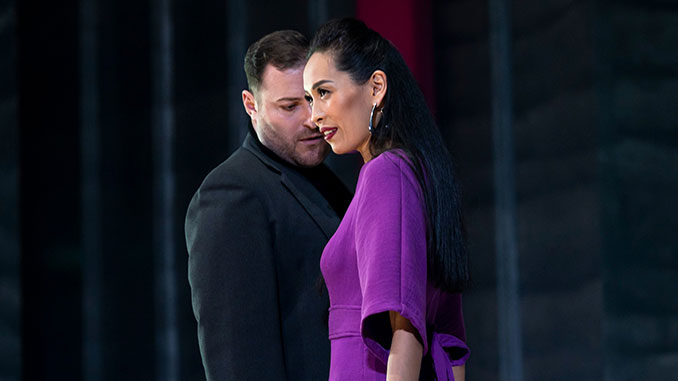 Simmering with unsettling emotional transparency before erupting in unconscionable horrific tragedy, the ancient Greek tragedy of Medea (Médée in French) comes dramatised with remarkable insight and musical ripeness courtesy of French baroque composer Marc-Antoine Charpentier and librettist Thomas Corneille.
Simmering with unsettling emotional transparency before erupting in unconscionable horrific tragedy, the ancient Greek tragedy of Medea (Médée in French) comes dramatised with remarkable insight and musical ripeness courtesy of French baroque composer Marc-Antoine Charpentier and librettist Thomas Corneille.
Premiered in 1693 during the reign of Louis XIV, Charpentier’s Médée has only now been unpacked for an Australian premiere by the baroque specialist team at Sydney’s Pinchgut Opera – and staged with edifying results.
Virtually neglected since his death through to the late 20th century, Charpentier (1645-1704) has come to light as a composer now regarded as gifted as Parisian contemporary Jean-Baptiste Lully (1632-1687).
In Charpentier’s Médée, like so many works in the operatic canon, intersecting themes of love, honour and revenge culminate in tragic circumstances most observers would see as avoidable.
Here, Medea is depicted as a semi-divine being – both mortal woman and otherworldly sorcerer – an outsider having fled her homeland to be with her beloved. Her desire only to be human is overturned by male-dominated political and corruption surrounding her -a modern day scenario in every sense.
Exercising magical powers in the name of love – being the reason her husband Jason becomes the hero he is – Medea ultimately destroys him after he betrays her. She poisons his lover Créuse and has the guards of Créuse’s father Créon turn on him since Créon had helped facilitate the union of Jason and Créuse. Most monstrously, at the price of punishing herself, she murders her two young boys as Jason’s final punishment.
If Charpentier’s Médée speaks to its audience plainly, it suggests in the most extreme manner, that love is rarely, if ever, pure, static or good god, unconditional. It is a deeply piercing story demanding attention, characterised by emotively fluid and lusciously phrased music of striking moods.
Originally scheduled for the 2020 season featuring Caitlin Hulcup but postponed due to pandemic restrictions, Médée opened Thursday night with another acclaimed Australian-born UK-based mezzo-soprano in the title role, Catherine Carby.
As the Princess of Colchis, Carby thoroughly inhabits the role of Médée, calibrating her performance with incisiveness and imparting affecting nuance to her character’s psychological development. In particular, Act 3’s Quel prix de mon amour (What a price for my love) creates a central highlight as a formidable example of voice and heart attuned to soul-bearing anguish. Carby utilises her richly textured mezzo-soprano to great effect as the love she tries to hold onto is crushed by a revenge her sorcery can aid.
Michael Petruccelli is exceptional in the role of the duplicitous Jason, Prince of Thessaly, adapting his handsome and mature tenor in highly sculptured and rewarding ways in partnership with a strong and purposeful stage presence.
Deep and molten, bass-baritone Adrian Tamburini brings requisite commanding strength and sly intimidation to Créon, King of Corinth. Soprano Cathy-Di Zhang gilds the role of Créuse, Princess of Corinth, with her fine penetrating soprano and seductive spell while baritone Andrew Finden makes a strapping and persuasive Oronte, Jason’s rival for Créuse’s heart.
Beautiful soprano Chloe Lankshear lends a softly contrasted caring hand as Médée’s confidante Nérine and an unbroken succession of superbly sung smaller roles, together with the deliciously harmonised voices of Cantillation, stud the musical score impressively.
As he commonly does, Artistic Director Erin Helyard led the 29-strong musicians of the Orchestra of the Antipodes from harpsichord with untiring energetic authority on opening night, enabling Charpentier’s rich harmonies to resonate with kaleidoscopic appeal while infusing meaning with thoughtfully mixed tempi. Vocally and musically, it was Pinchgut at their usual soaring standards.
In place of Euripides’ ancient Corinth-set tragedy, director Justin Way offers an unspecified but contemporary-dressed, artistically lit and stylised setting to connect with his audience – Charles Davis (designer) Damien Cooper (lighting) and David Bergman (video design).
Within a large space evoking classical formality, Davis’ austere design features an oversized stratified head resembling Tamburini’s Créon that undergoes subtle video transformations – including a head surrounded by swirling hair as Médée unleashes her sorcery in a nod to the snake-haired Medusa.
Imposing as it is, while the prominent head likely signifies absolute power, be it political, personal or supernatural, its dominance in my mind detracts from, among other aspects of the drama, Médée’s own psychological shifts which Carby so potently portrays.
Movement director Troy Honeysett’s skills appear generously employed and demarcate the handful of textless orchestral sequences with notable flair, with collective movements settling down to more naturally flowing action as the work’s five acts progress. Médée’s spell on Créon’s guards in particular is treated in excellent theatrical slo-mo.
Almost 330 years on, Médée brims with musical richness and dramatic excitement but, most of all, it brings its audience face to face with the human condition. Not even a technical glitch that prevented the display of English surtitles for a good part of Acts 4 and 5 could destroy that encounter.
Médée
City Recital Hall, 2 Angel Place, Sydney
Performance: Thursday 1 December 2022
Season continues to Wednesday 7 December 2022
Information and Bookings: www.pinchgutopera.com.au
Image: Michael Petruccelli and Cathy-Di Zhang – photo by Cassandra Hannagan
Review: Paul Selar
